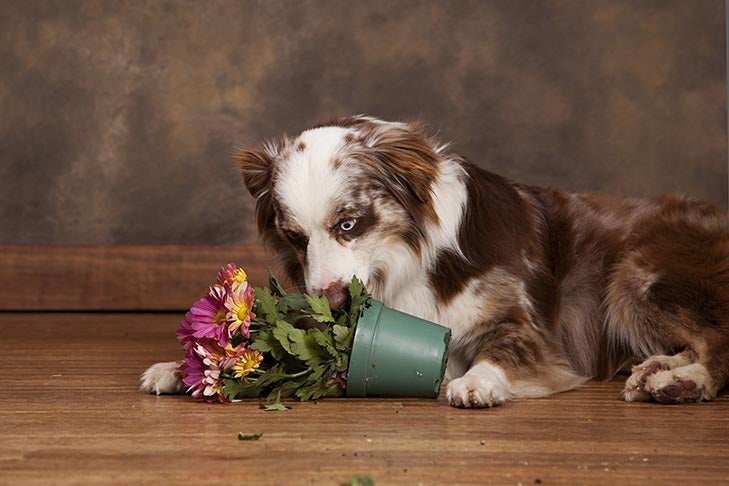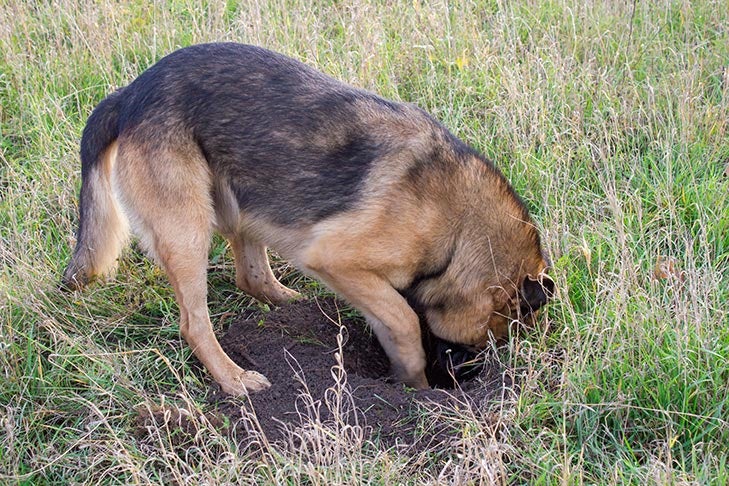Clubs Offering:
As a pet owner, you may have caught your dog eating (or attempting to eat) some pretty weird stuff. But have you ever observed your pet snacking on straight-up dirt?
Holistic veterinarian Dr. Laurie S. Coger, DVM, explains, “Dirt eating is a form of what is termed ‘pica,’ the ingestion of nonfood materials. There are many causes, including nutritional, behavioral, and physical. Stress or boredom can also lead to eating all sorts of things, including dirt.”
If your dog is continually eating dirt, you shouldn’t discount this behavior. It could be a sign of a bigger issue, such as:
Dr. Coger notes that while stomach and gastrointestinal issues could be to blame for your dog’s interest in dirt, canines are more likely to seek out grass in these cases. “If [the dirt eating] is frequent, intense/manic in nature, or large quantities are consumed, then it’s time to go to the vet,” she says. “Changes in stool would be another sign that a vet visit is in order. Bloodwork to look for underlying abnormalities may be helpful in pinpointing a cause.”

As you may expect, there are risks to letting your dog continually eat dirt. The main risk is impaction of the intestine (hardened stool that gets stuck in the body due to long-term constipation) if your dog eats a lot at once. Impaction often means surgery. “
The dirt could also contain pesticides, fertilizers, or other toxins that could reach toxic levels if enough dirt was ingested,” Dr. Coger adds. “Depending on the dirt, dental damage or wear could also be a concern.” If the dirt has rocks in it, for example, it could cause damage to your dog’s teeth and cause obstruction in the throat or any point along the digestive tract. Sharp sticks could puncture the linings of your dog’s mouth, throat, intestine, or stomach. It’s also possible that your dog could ingest a parasite along with the dirt, which can cause a range of additional health issues.
“I would add that any new, unnatural behavior, such as dirt eating, should be acted upon quickly,” Dr. Coger says, “both because of possible serious underlying causes and before it becomes a habit. Dogs will learn from other dogs in the house, and who wants a houseful of dirt eaters?”

If you’re worried that your dog’s dirt eating is due to a nutritional imbalance, you should consult your veterinarian about your canine companion’s diet and whether changes need to be made. On the behavior side, make sure your dog is getting enough physical and mental exercise to curb dirt eating that stems from boredom. If all else fails, “denying access to favorite dirt-eating areas may be required,” Dr. Coger says. Remember, dirt eating may be a sign of something bigger, so you should never ignore it.
Tasty Dirt
A less serious cause is simply that your dog is going after something tasty, like bacon or hamburger grease under a grill. Check the area to make sure there isn’t something your dog is trying to get to … especially if he keeps going back to it!
Humans exhibit strange habits out of stress and boredom – hair twirling, knuckle cracking, overeating, etc. Same goes for our pets who are designed to be active and outdoors, and who don’t always get all the stimulation they require.
Picture a large working dog being stuck home alone all day… He’s probably going to find a way to entertain himself, possibly by eating dirt.
“Some dogs, especially youngsters and puppies may simply eat dirt out of pure boredom,” says Osborne. “This could be from a multitude of reasons such as lack of exercise, being cooped up in a kennel during the day, not enough playtime, or a lack of proper social interaction. Remember, dogs, like people, need a job and a daily purpose, especially when dealing with herding and high-energy breeds. In general, dogs enjoy jobs, so if your canine’s behavior seems out of sorts, give him something to do. Doggie day care facilities offer unlimited opportunities for socialization and human and canine interaction. In addition, they relieve boredom and for most are just plain fun!”
Like humans, dogs can also have obsessive-compulsive disorder. A dog with OCD may start to eat dirt obsessively as part of the disorder. If you suspect OCD or a related behavior disorder, consult with your holistic vet or an animal behaviorist.
“Eating dirt” sounds so strange, but in fact some clay can be used to soothe digestive problems, help with parasites and for detoxification.
Could it be our dogs are instinctively trying to soothe or detox a digestive issue by eating dirt? It could very well be so.
“My instinct is that the dog is looking to get whatever is in the digestive tract moving out, either by throwing up or by pushing it through,” says Coger. “Dirt could act as mild abrasive to ‘scrub’ clean the inside of the intestines. It could also stimulate more contractions of the intestine, moving material through the digestive tract more quickly.”
Why Do Puppies Eat Everything?
Puppies pick up objects and explore the world with their mouths. Chewing, mouthing, and sometimes swallowing stuff is their way of finding out whats edible and (ideally) whats not. Although this behavior stems from a natural instinct that puppies often outgrow—especially with the help of training—it can get them into trouble, even leading to blockages or poisoning.
Eating an inappropriate object can become tempting—even irresistible—when its flavored or scented. Common problem items include grease-covered utensils from the kitchen, milky baby bottle nipples, and used tampons or soiled diapers.
Other problem items are those that tend to smell like you, such as worn socks or slippers, so its important to keep all such items out of your puppys reach until it learns that theyre not acceptable chow.
:max_bytes(150000):strip_icc()/why-your-puppy-eats-everything-2804589-01-25b7065f1748408c9def0faa2c9ee493.jpg)
Repeatedly ingesting non-edible objects is called pica. Puppies often accidentally swallow pieces of toys, but pica refers to an almost-obsessive urge to eat rocks or chomp mouthfuls of dirt, sticks, sand, or other non-digestible material. One cause is that essential nutrients are missing from an animals diet. If you suspect your puppy is exhibiting signs of this behavior, consult your veterinarian.
Many canines occasionally eat grass, which may provide vitamins that your puppy craves. Your pup might also simply like the taste. Occasional grazing typically isnt a cause for concern unless it develops into gnawing on poisonous plants.
:max_bytes(150000):strip_icc()/why-your-puppy-eats-everything-2804589-03-7730a973d0a649aaae234e6b98b1b892.jpg)